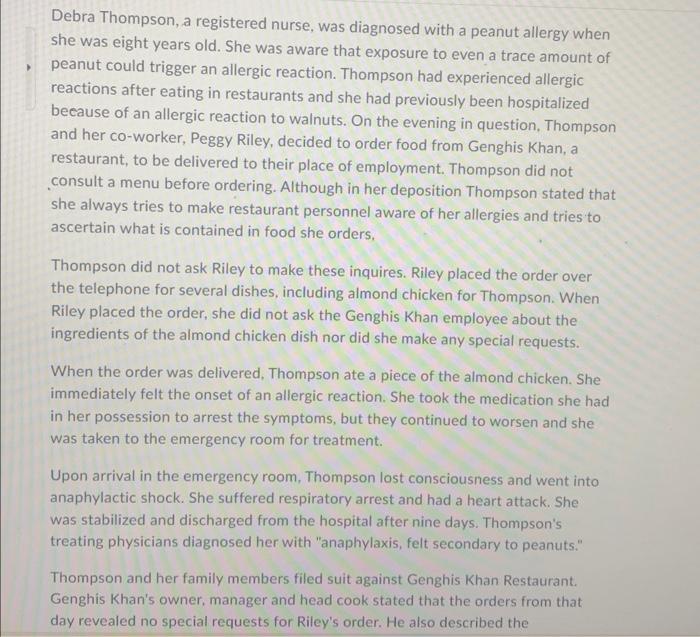
Debra Thompson, a registered nurse, was diagnosed with a peanut allergy when she was eight years old. She was aware that exposure to even a trace amount of peanut could trigger an allergic reaction. Thompson had experienced allergic reactions after eating in restaurants and she had previously been hospitalized because of an allergic reaction to walnuts. On the evening in question. Thompson and her co-worker, Peggy Riley, decided to order food from Genghis Khan, a restaurant, to be delivered to their place of employment. Thompson did not consult a menu before ordering. Although in her deposition Thompson stated that she always tries to make restaurant personnel aware of her allergies and tries to ascertain what is contained in food she orders, Thompson did not ask Riley to make these inquires. Riley placed the order over the telephone for several dishes, including almond chicken for Thompson. When Riley placed the order, she did not ask the Genghis Khan employee about the ingredients of the almond chicken dish nor did she make any special requests. When the order was delivered, Thompson ate a piece of the almond chicken. She immediately felt the onset of an allergic reaction. She took the medication she had in her possession to arrest the symptoms, but they continued to worsen and she was taken to the emergency room for treatment. Upon arrival in the emergency room, Thompson lost consciousness and went into anaphylactic shock. She suffered respiratory arrest and had a heart attack. She was stabilized and discharged from the hospital after nine days. Thompson's treating physicians diagnosed her with "anaphylaxis, felt secondary to peanuts." Thompson and her family members filed suit against Genghis Khan Restaurant. Genghis Khan's owner, manager and head cook stated that the orders from that day revealed no special requests for Riley's order. He also described the make data shareable between CRM systems and marketing automation. Debra Thompson, a registered nurse, was diagnosed with a peanut allergy when she was eight years old. She was aware that exposure to even a trace amount of peanut could trigger an allergic reaction. Thompson had experienced allergic reactions after eating in restaurants and she had previously been hospitalized because of an allergic reaction to walnuts. On the evening in question. Thompson and her co-worker, Peggy Riley, decided to order food from Genghis Khan, a restaurant, to be delivered to their place of employment. Thompson did not consult a menu before ordering. Although in her deposition Thompson stated that she always tries to make restaurant personnel aware of her allergies and tries to ascertain what is contained in food she orders, Thompson did not ask Riley to make these inquires. Riley placed the order over the telephone for several dishes, including almond chicken for Thompson. When Riley placed the order, she did not ask the Genghis Khan employee about the ingredients of the almond chicken dish nor did she make any special requests. When the order was delivered, Thompson ate a piece of the almond chicken. She immediately felt the onset of an allergic reaction. She took the medication she had in her possession to arrest the symptoms, but they continued to worsen and she was taken to the emergency room for treatment. Upon arrival in the emergency room, Thompson lost consciousness and went into anaphylactic shock. She suffered respiratory arrest and had a heart attack. She was stabilized and discharged from the hospital after nine days. Thompson's treating physicians diagnosed her with "anaphylaxis, felt secondary to peanuts." Thompson and her family members filed suit against Genghis Khan Restaurant. Genghis Khan's owner, manager and head cook stated that the orders from that day revealed no special requests for Riley's order. He also described the make data shareable between CRM systems and marketing automation








